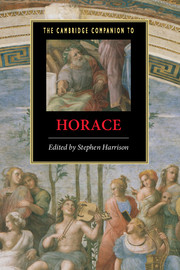Book contents
- Frontmatter
- Introduction
- Part 1: Orientations
- 1 Horace: life and chronology
- 2 Horatian self-representations
- 3 Horace and archaic Greek poetry
- 4 Horace and Hellenistic poetry
- 5 Horace and Roman literary history
- 6 Horace and Augustus
- Part 2: Poetic Genres
- Part 3: Poetic Themes
- Part 4: Receptions
- Dateline of works and major political events
- Works cited
- Index
1 - Horace: life and chronology
from Part 1: - Orientations
Published online by Cambridge University Press: 28 May 2007
- Frontmatter
- Introduction
- Part 1: Orientations
- 1 Horace: life and chronology
- 2 Horatian self-representations
- 3 Horace and archaic Greek poetry
- 4 Horace and Hellenistic poetry
- 5 Horace and Roman literary history
- 6 Horace and Augustus
- Part 2: Poetic Genres
- Part 3: Poetic Themes
- Part 4: Receptions
- Dateline of works and major political events
- Works cited
- Index
Summary
Horace says more about himself than any other ancient poet does, and our main source for his life must be his own poems. A subsidiary authority is the ancient Vita abbreviated from Suetonius, De Poetis; his official posts under Hadrian enabled him to quote the correspondence of Augustus.
From Venusia to Philippi (65-42 bce)
Quintus Horatius Flaccus was born on 8 December 65 bce; the Romans cared more than the Greeks for dates and birthdays. His birthplace was Venusia (Venosa) on the border of Apulia and Lucania (Satires 2.1.34-5). He recalls the mountains of his homeland (Satires 1.5.77-8, Odes 3.4.9-16) and the river Aufidus or Ofanto (Odes 3.30.10, 4.9.2), but the ties were not to last.
Horace was the son of a freedman, though he himself was born free (cf. Satires 1.6.8). Moderns have speculated about Greek or even Eastern roots, but he seems to have regarded himself as a Sabellus or Samnite (Epistles 1.16.49, cf. Satires 2.1.35-6); his father had perhaps been enslaved as a result of capture in the Social War. The reproach of servile origin rankled (Satires 1.6.45-8), but was later exploited by the poet when he wished to exaggerate the humbleness of his background (Epistles 1.20.20).
- Type
- Chapter
- Information
- The Cambridge Companion to Horace , pp. 7 - 21Publisher: Cambridge University PressPrint publication year: 2007
- 14
- Cited by

